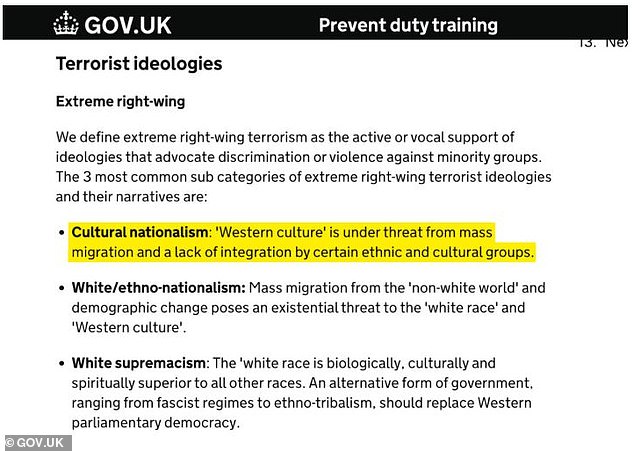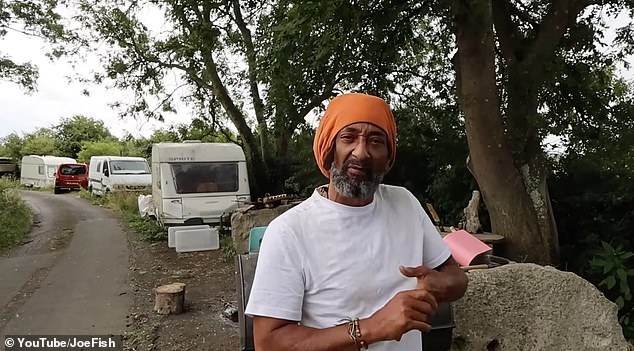Record numbers of over-60s are being referred to the Government’s troubled anti-terrorism scheme, the Daily Mail can reveal today.
Home Office figures show 127 adults in their 60s or beyond were put on Prevent’s radar in 2023/24 – the most since records began in 2016.
Of them, 43 had sparked alarm for expressing ‘extreme right wing’ views.
Extreme right wing ideologies ‘can be broadly characterised as cultural nationalism, white nationalism and white supremacism’, officials say. Guidance published online states they also use violence to further their aims.
Yet free speech campaigners fear that anyone critical of mass immigration might be being wrongly labelled an ‘extremist’.
Last month, it was revealed how Prevent training documents listed sharing the view that Western culture was ‘under threat from mass migration and a lack of integration’ was a ‘terrorist ideology’.
And in 2023, it emerged that popular British sitcoms, including comedies Yes Minister and The Thick Of It, were marked as ‘key texts’ for white nationalists.
Even the 1955 epic war film The Dam Busters and The Complete Works Of William Shakespeare were flagged as possible red flags of extremism by Prevent’s Research Information and Communications Unit.
Across all age groups, more than 1,300 people were referred to Prevent last year for ‘extreme right wing’ behaviour, including 27 kids under the age of ten.
While ‘extreme right wing’ referrals have been stable since records began in 2016, the reports for over 60s in all categories has more than doubled – rising from 59 in 2016, to 127 in 2023.
Over the same period, the overall number of referrals under the Islamist umbrella has plunged by 75 per cent, from 3,706 to 913 – or 13 per cent of the total.
Islamist terrorism relates to ‘the threat or use of violence as a means to establish a strict interpretation of an Islamic society’.
A damning public report warned in 2023 that Prevent had been experiencing a ‘loss of focus’ as it had become distracted by far right cases, rather than concentrating on Islamists.
In his long-awaited 188-page report, William Shawcross claimed too many resources were being focused on right-wing terrorism rather than its Islamist equivalent, which has been responsible for far more deadly attacks.
Since 2015, the law has placed public bodies, such as schools and the police, under a legal duty to identify people in danger of turning to extremism.
But the £49million-a-year Prevent scheme has faced huge criticism over its failures in spotting Islamist terror sympathisers, including those with links to notorious hate preacher Anjem Choudary.
Southport murderer Axel Rudakubana was also missed, despite being referred to the deradicalisation body three times before he went on to knife three children to death in July 2024.
The scheme works by local council-appointed Prevent coordinators taking referrals from public servants like teachers and social workers, with each individual of concern categorised by their ideology.
Less serious cases are dealt with by councils, who can offer services like mentoring or parenting support, while the more serious ones go to Channel, where a panel of local officials, including police, will recommend the next steps.
If Prevent officers find no risk of radicalisation while conducting initial checks, the case is immediately closed.
Potential threats from left wing organisations are also included in the annual Prevent figures, although an exact toll is not provided as counter-terror chiefs view the risk as slim.
Expressing sympathy or admiration for the likes of Adolf Hitler or praising extremists would be enough to risk being flagged to Prevent if overheard by a teacher, social worker or even work colleague.
However concerns have been raised after Prevent has also been flagging far more mainstream views.
Pictures from a Prevent online training course emerged last month which highlighted ‘dangerous’ beliefs such as ‘Cultural nationalism’ and the idea ‘Western culture is under threat’.
Critics warned the definition of ‘cultural nationalism’ is too broad and could even encompass the likes of Sir Keir Starmer’s ‘island of strangers’ speech – despite polling showing most Brits agreed with him.

There are three categories of ‘Extreme right-wing’ terrorism according to Prevent. They are ‘Cultural nationalism’, ‘white/ethno-nationalism’ and ‘white supremacism’
Prevent faced a barrage of criticism last year when a 12-year-old schoolboy was investigated by counter-extremism officers after he declared there ‘are only two genders’.
The child made a video, posted online, in which he also stated: ‘There’s no such thing as non-binary’.
But the school told the boy’s mother they would refer him to Prevent amid fears he could be at risk of being radicalised by the far-right. The boy’s mother was visited by Prevent and Northumbria Police officers, in a meeting she described as ‘an interrogation’.
Other teenage boys face investigation by anti-terrorism officers if they make sexist remarks in the classroom, it was claimed.
One source said previously comments about a ‘woman’s place being in the kitchen’ could be enough to spark a referral to the unit.
The personal details of those referred to Prevent are retained on its databases for at least six years and duplicated across police and intelligence systems.
It comes as counter terrorism officers urged parents to keep an eye out for signs that their child could be drawn into extremism after Netflix’s Adolescence became a topic of mainstream political debate.
In April, the Met Police’s Prevent co-coordinator told parents to ‘take an active interest’ in their child’s online activities so they can be aware of signs that they could be vulnerable to radicalisation.
Adolescence examines so-called incel (involuntary celibate) culture, which is related to violence and hating women. However, the latest data shows incels make up less than one per cent of Prevent referrals.
Prevent is the first tier in the Government’s anti radicalisation strategy.
After an initial discussion with police, a case can be diverted to Channel process – a voluntary programme designed to support people deemed terrorist threats.

In 2023, it emerged that popular British sitcoms – including comedies Yes Minister and The Thick Of It – were marked as ‘key texts’ for white nationalists and supremacists. Pictured: Peter Capaldi as Malcolm Tucker in The Thick Of It

The leaked report was produced by civil servants within the Prevent scheme’s Research Information and Communications Unit (RICU), which previously said shows like Yes Minister pointed to a possible red flags for extremism
People who accept help from Channel can get assistance through mentoring, religious guidance, education and even help with housing and hobbies in a bid to lead them away from trouble.
If people at risk of radicalisation refuse help or are at continued risk of radicalisation, they will be continually monitored by police.
In the past, Prevent has been criticised by groups who claim it discriminates against Muslims and children.
Others have claimed it lacks transparency, as people are often unaware why they have been referred or how they can challenge it.
However a study by the Counter Extremism Group, a think tank close to the government, previously found many of the attacks on the programme were misguided and relied largely on ‘speculation and unproven assumptions’ by ‘anti-Prevent activists’.
A Home Office spokesperson said: ‘Since it first came into existence two decades ago, the Prevent programme has dealt with a wide range of individuals where concerns have been raised about their potential radicalisation.
‘The make-up of the individuals referred to Prevent may change over time, but the role of the programme in stopping people from becoming terrorists remains the same.’
The number of referrals might include individuals who have been reported more than once during the year.












